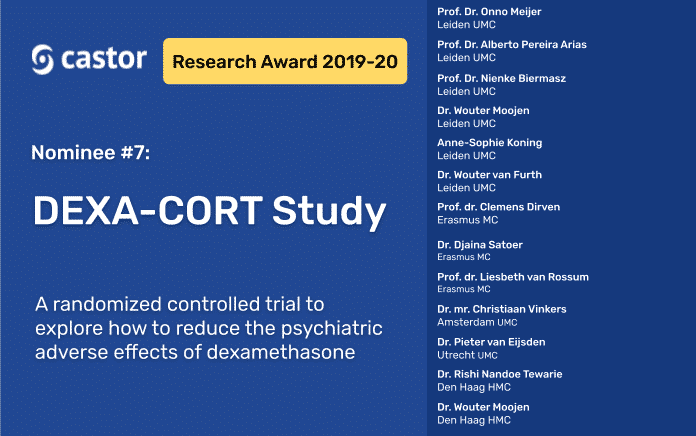Dexamethasone is a synthetic glucocorticoid used by patients for immune-suppressive effects. But the drug can have severe side effects. Nominee # 7 DEXA-CORT study posits that giving cortisol can suppress the side effects of dexamethasone.
Research Overview
The DEXA-CORT study asks how to reduce the psychiatric adverse effects of dexamethasone. Dexamethasone is a synthetic glucocorticoid and is used by many patients for its immune-suppressive effects. However, dexamethasone can have severe side effects like depression, anxiety, and delirium. Dexamethasone acts only via glucocorticoid receptors (GRs), while the naturally produced hormone cortisol also stimulates mineralocorticoid receptors (MRs). An unwanted side effect of dexamethasone is a strong suppression of cortisol levels. When there is no cortisol produced, the MRs will be empty. The adverse effects of dexamethasone may therefore not only be caused by too much activation of GR but also by too little activation of MR.
MR is important for brain function. The study team posits that refilling this receptor by giving cortisol together with dexamethasone the psychiatric side effects might disappear or diminish. This refilling has been tested in children with leukemia who received dexamethasone treatment (Warris et al. 2016). In that study, the severe adverse effects on psychology and sleep from dexamethasone were alleviated with coadministration of cortisol. DEXA-Cort will test this in an adult population; patients with a brain tumor for which they will get surgery. These patients are treated with high dose dexamethasone to suppress inflammation and to reduce edema. The study will add cortisol to the dexamethasone medication and this way and watch for the psychiatric adverse effects of dexamethasone to disappear.
About the team
Anne-Sophie Koning, the author of the CRA submission, works with a multi-disciplinary team, including professors, doctors, neurosurgeons, researchers, and nurses from different disciplines. Each team member brings different approaches and insights into the study. The team includes:
Department of Medicine, Division of Endocrinology, LUMC, Leiden, The Netherlands
- Prof. dr. Onno Meijer
- Prof. dr. Alberto Pereira Arias
- Prof. dr. Nienke Biermasz
- Dr. Wouter Moojen
- Anne-Sophie Koning
- Department of Neurosurgery, LUMC, Leiden, The Netherlands
- Dr. Wouter van Furth
Department of Neurosurgery, Erasmus MC, Rotterdam, The Netherlands
- Prof. dr. Clemens Dirven
- Dr. Djaina Satoer
Department of Medicine, Division of Endocrinology, Erasmus MC, Rotterdam, The Netherlands
- Prof. dr. Liesbeth van Rossum
Department of Psychiatry, Amsterdam UMC, Amsterdam, The Netherlands
- Dr. mr. Christiaan Vinkers
Department of Neurosurgery, UMC Utrecht, Utrecht, The Netherlands
- Dr. Pieter van Eijsden
Department of Neurosurgery, HMC, Den Haag, The Netherlands
- Dr. Rishi Nandoe Tewarie
- Dr. Wouter Moojen
Study design and methodology
DEXA-CORT is a multicenter Randomized Clinical Trial in four medical centers:
- Leiden University Medical Center (LUMC) in Leiden
- Erasmus University Medical Center in Rotterdam
- University Medical Center Utrecht
- Haaglanden Medical Center at the Hague
The study includes brain tumor patients (cranial glioma or meningioma) scheduled for surgery. This patient group is routinely treated with high doses of dexamethasone perioperatively. The study will have two study arms: one group will receive additional cortisol to the dexamethasone while the other group will receive an additional placebo to the dexamethasone. In total, we will include 180 patients, 90 per study arm. Patients will be included by the neurosurgeons based on the inclusion and exclusion criteria. All data will be analyzed on an intention-to-treat basis.
Research outcome
The main outcome is the presence of psychiatric problems during dexamethasone treatment. The team will measure this with an interview called the Brief Psychiatric Rating Scale (BPRS). The BPRS evaluates the presence and seriousness of 24 symptoms. We score the BPRS three times; before surgery, the day of discharge from the hospital after surgery, and five to eight weeks after surgery.
Secondary outcomes of this trial are questionnaires assessing psychiatric symptoms, sleep quality, quality of life, cognitive functioning, plus the short- and long-term effects of the cortisol addition. We will also collect a piece of residual tumor tissue removed during surgery to investigate the effect of cortisol on the receptor level.
How DEXA-CORT team uses Castor
Castor is the DEXA-CORT study data management system and is used to collect all the data, including questionnaire surveys. This allows patients to fill in most of the questionnaires at home, which is very convenient for our study population.
“We really like the possibility of sending surveys to patients,” said Anne-Sophie Konig.
“This is very convenient because patients need not come to the hospital for extra visits. We can remind them to fill in the questionnaire when needed and the answers are stored in the database. Another useful tool is the export possibilities to SPSS and Excel. In addition, the report feature is useful for adding an Adverse Event (AE) or Serious Adverse Event (SAE). Using Castor allows us to check and keep track of all the reported AEs and SAEs.”
Stay tuned on the Castor EDC blog for more 2019-2020 Castor Research Awards nominations. We wish the nominees good luck and smart science—and encourage all researchers to share their projects for the chance to win €3000!




